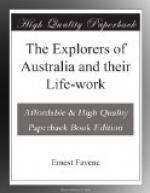“Distressing and fatal as the continuance of these cliffs might prove to us, there was a grandeur and sublimity in their appearance that was most imposing, and which struck me with admiration. Stretching out before us in lofty, unbroken outline, they presented the singular and romantic appearance of massy battlements of masonry, supported by huge buttresses, glittering in the morning sun which had now risen upon them, and made the scene beautiful even amidst the dangers and anxieties of our situation.”
Five days of slow, dragging toil passed, until, with the horses at their last gasp, and the men baked and parched, they found relief in some native wells amongst the sandhills, at a point where the cliffs receded from the sea.
After resting for some days at this camp, Eyre, misled by a report he had obtained from the natives, again moved forward, taking with him but a small supply of water. When he had discovered the blunder, he had gone forty miles, and over this weary distance the horses had to return. It was one of those mishaps that helped so much to wear out his unfortunate animals.
Trouble after trouble now added itself to the burden of the explorers. Another five days had passed without water, and their only hopes rested upon some sandhills ahead, seen from the sea by Flinders, and marked by him upon his chart. Retreat was impossible, and with their horses failing one after another, they toiled on, desperate and well-nigh hopeless. Eyre’s anxiety was increased by Baxter’s growing despondency and pessimistic view of the issue of their enterprise. They were now travelling along the sea beach, firm and hard, and ominously marked with wreckage. Their last drop of water had been consumed, and that morning they had been collecting dew from the bushes with a sponge, as a last resource. When they reached the sand-dunes, they were almost too weak to search for a likely place to dig for water; but making a final effort, they discovered a patch whence, at six feet, they obtained a supply of water.
It was now that Eyre approached the grand crisis of his adventurous journey. According to the chart compiled by Flinders, he had another long succession of cliffs to encounter, and he knew that where these cliffs came in and sternly fronted the ocean, he need hope for no relief. Should this space be happily surmounted by a desperate effort, he hoped to reach a kindlier country. Disaffection appeared in his small camp. Baxter was always suggesting and even urging a return. Perhaps some shadow of his tragic fate overhung his spirit. The native boys were ripe for desertion, and two of them did desert, only to return in a few days, starving, and apparently repentant. Better for Eyre had they gone altogether. Amid such discouraging surroundings did Eyre commence his last struggle with the cliffs of the Great Bight.




